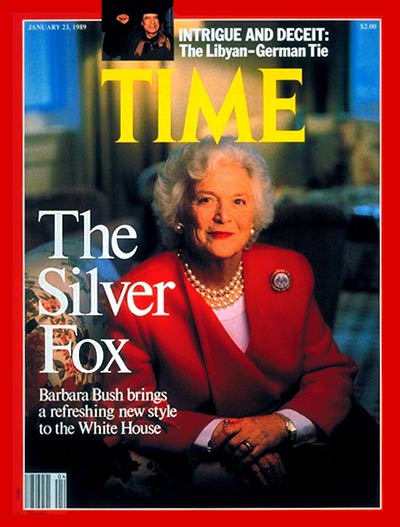
Former First Lady Barbara Bush, wife of former President George H.W. Bush and mother to former President George W. Bush, died on Tuesday at the age of 92.
She was born Barbara Pierce, the daughter of publisher Marvin Pierce, and attended Smith College until she dropped out to marry George H.W. Bush, whom she’d met at a party in Greenwich, Conn., over a winter break. As a result of that meeting, she would garner important, if subtle, political influence.
When Margaret Carlson, who also memorialized Bush for TIME on Tuesday, profiled the then-new First Lady in a TIME cover story entitled “The Silver Fox” in the Jan. 23, 1989, issue, the magazine explored how she would make the transition from the role of Second Lady—more able to speak her mind, not quite so visible—to White House resident. And, as the story explained, she seemed like “the right woman in the right place.” She seemed to walk the line between the necessarily supporting nature of the role and the personal activism expected of a First Lady, campaigning “tirelessly” for her husband but also finding inspiration in her role as a mother and wife.
Sure enough, when her husband was elected the 41st President of the United States, she promoted efforts to combat illiteracy (inspired by her son Neil’s dyslexia) and research for cancer cures (inspired by the death of her daughter Robin at just 3 years old). Here’s how TIME described the way that she wielded influence in her husband’s political career in his time leading up to the White House:
Barbara has been most influential on issues that concern her deeply or where her husband is behind the curve, like AIDS, the homeless, civil rights and education. In the late 1950s, she battled segregationist innkeepers who refused to let the family’s black baby-sitter stay with them in the same hotel. She was instrumental in the appointment of the only black in Bush‘s Cabinet, Dr. Louis Sullivan, whom she came to know from her work at [Atlanta’s Morehouse School of Medicine].
It was Barbara‘s visits to AIDS hospitals in Harlem that nudged her husband into endorsing additional federal funds for fighting the disease when the Reagan Administration was still balking. Similarly, after an early debate when her husband brushed aside a question about the homeless with boiler plate about housing, Barbara exhorted him to make homelessness a campaign issue. ”She really talked hard at him,” said an aide, ”and rode him until he got it right.” Barbara‘s interest in children and literacy, meanwhile, helped Bush commit himself to being the ”education President.” ”Every time he says ‘Head Start,’ that’s Bar,” says Sheila Tate, Bush‘s transition spokeswoman.
Barbara tries to mask her views where they differ from her husband’s. Her preferred line on abortion is ”I’m not going to tell you my opinion,” a perhaps pointedly transparent admission of her pro-choice views, since if she agreed with Bush she would presumably say so. She disagreed behind the scenes with his hardball campaign tactics, masterminded by Jim Baker, Atwater, Roger Ailes and others. Late in the general-election campaign, aides sensed Barbara’s unseen hand after speeches were rewritten in a softer tone. ”There were drafts of speeches that went into the suite at night and came out the next morning with changes,” an aide recalls.
Some staffers credit Barbara with getting George to suddenly pledge cleaner campaign tactics at a fund raiser last fall at Bob Hope’s Hollywood spread. The announcement so stunned aides that they disappeared on purpose afterward. But Barbara wasn’t all softball. When Bush was resisting advice to air the now famous ”straddle ad” in New Hampshire that showed Iowa caucus victor Robert Dole flip-flopping on taxes, Barbara finally chimed in, ”I don’t see anything wrong with that ad.” It ran, and Bush took the state by 10 points.
While she opted not to weigh in on policy, she mastered the politician’s art of dodging questions (“I’m not running for President, so I am not going to tell you my position on abortion. But I would love to tell you what George’s is.”) — yet when TIME asked her in 2015 to recall the best political advice she’s ever received, she had an answer that could serve anyone well.
“Be yourself,” she said. “Well, maybe someone a little nicer.”
More Must-Reads From TIME
- The 100 Most Influential People of 2024
- Coco Gauff Is Playing for Herself Now
- Scenes From Pro-Palestinian Encampments Across U.S. Universities
- 6 Compliments That Land Every Time
- If You're Dating Right Now , You're Brave: Column
- The AI That Could Heal a Divided Internet
- Fallout Is a Brilliant Model for the Future of Video Game Adaptations
- Want Weekly Recs on What to Watch, Read, and More? Sign Up for Worth Your Time
Write to Olivia B. Waxman at olivia.waxman@time.com